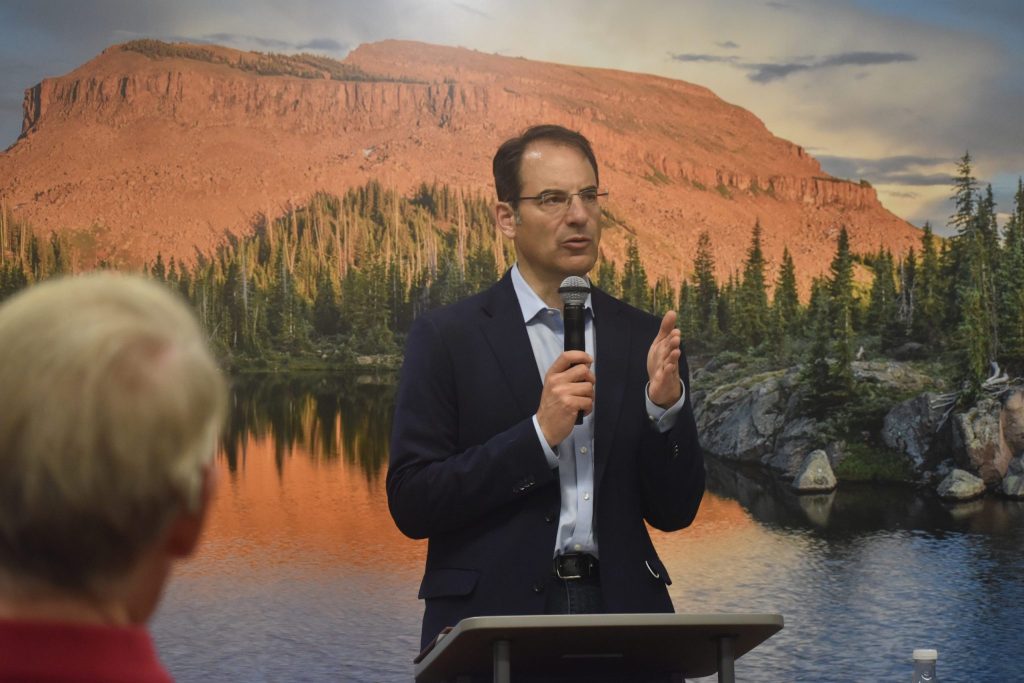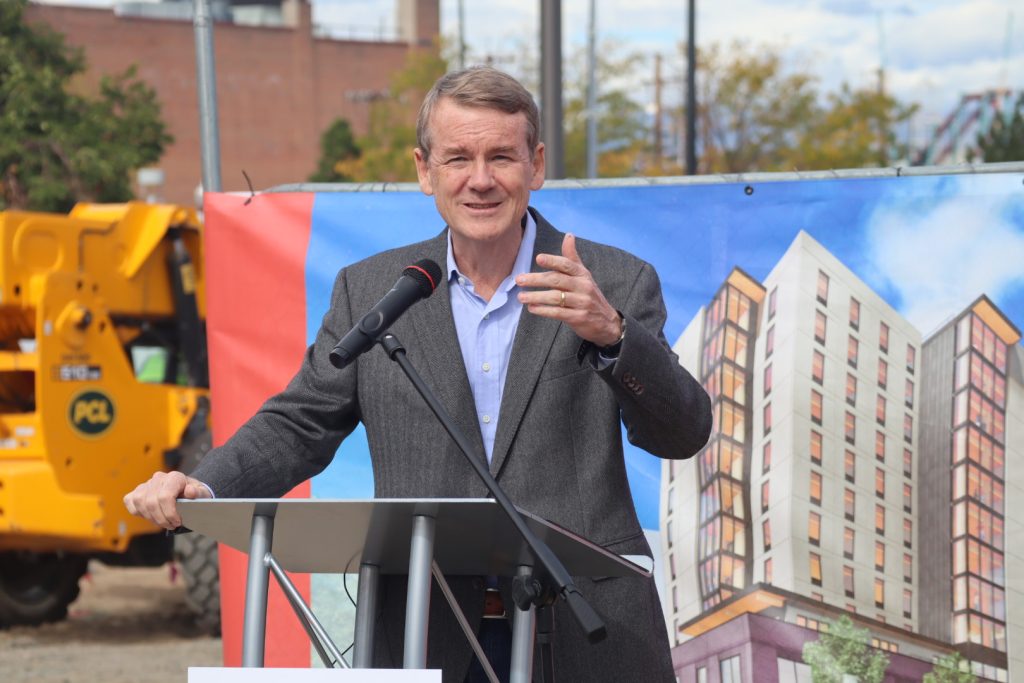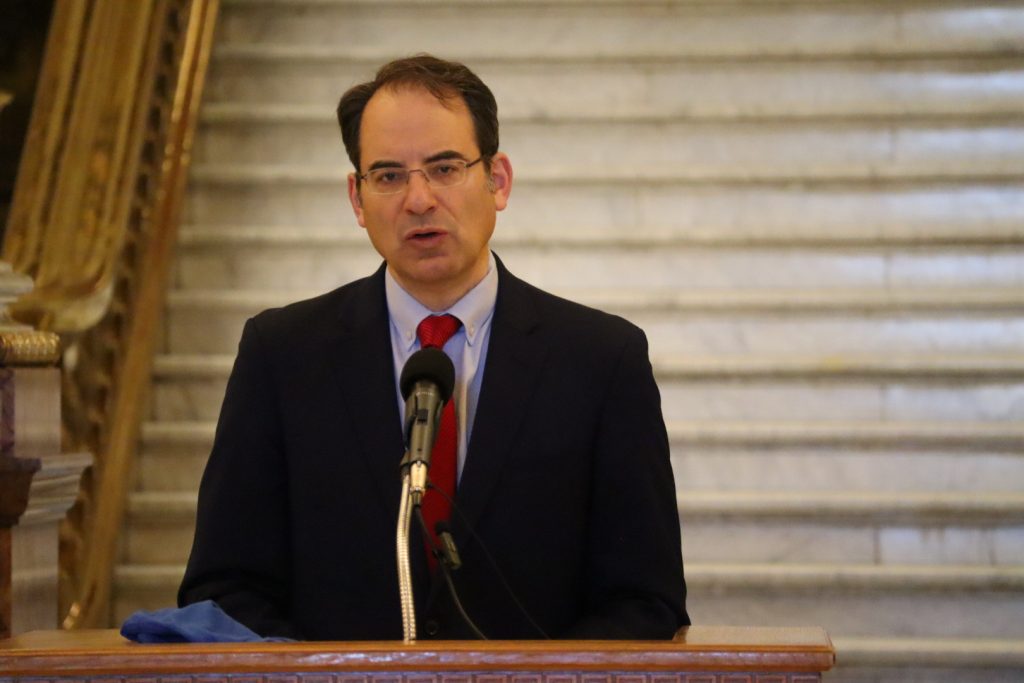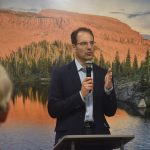Colorado AG Phil Weiser pledges ‘Day One’ action on affordable housing if elected governor next year
Weiser, who is running in a Democratic primary against U.S. Sen. Michael Bennet, says his affordable housing plan will emphasize renter protections, better address rural needs

Andrea Teres-Martinez/The Aspen Times
If elected governor, Colorado Attorney General Phil Weiser said his affordable housing plan will start on “Day One” with executive actions aimed at bolstering and streamlining the state’s housing strategies.
Weiser, who is running against U.S. Sen. Michael Bennet to be the Democratic nominee for governor next year, spoke with the Aspen Times on Thursday about his housing agenda as he continues to roll out more of his campaign platforms.
Whoever secures the Democratic nomination will have a strong chance of succeeding outgoing Gov. Jared Polis, who is term-limited and cannot run in 2026. Colorado voters haven’t elected a Republican governor since 2002. Polis, a Democrat, won his election in 2018 by more than 10 percentage points and was re-elected in 2022 by a margin of nearly 20 percentage points.
Housing affordability remains a significant challenge across much of the state, where home prices and rental rates remain historically high, particularly in rural resort areas. Polis made the issue central to his reelection campaign and second term as governor, championing a slew of legislative reforms like loosening land-use code and incentivizing more condominium development.
Weiser said he plans to pursue housing strategies that Polis has not, and will push his agenda through with both executive actions and by working with the legislature.
On his first day in office, Wesier plans to appoint a chief housing officer and sign an executive order to streamline housing programs, eliminate redundancies and coordinate all of the state’s housing efforts. He also wants to create a team that can serve as a single access point for all state and federal housing funds, while also launching an all-out government review of housing programs to identify red tape and speed up construction and permitting approvals.
Weiser argues that his agenda is “more specific and more comprehensive” than the housing plan put forward by Bennet in September, though there are areas of overlap.
Both Weiser and Bennet want to increase the number of affordable homes through faster permitting and funding, with Weiser calling for 40,000 “attainable” homes statewide, and Bennet proposing a 30% increase in the amount of “state-supported” housing by 2035. Both campaigns also pledge to centralize housing resources, expand down-payment assistance, support renters, and protect existing affordable housing.

Yet Weiser said his plan puts more emphasis on rural needs and renter protections than Bennet’s. Those are also two issues Weiser said he would approach differently from Polis.
“Right now, rural Colorado is being somewhat left behind, or not supported, by our housing policies,” Wesier said.
It’s an issue that’s come to a head before at the legislature, which took two years to pass Polis’ sweeping land-use reform bill that initially would’ve increased housing density requirements in municipalities across the state, including in mountain towns. Lawmakers eventually passed a narrower version of the measure that only targeted populous Front Range cities, while leaving mountain towns alone.
Ski town legislators and local officials had argued that just building more housing in rural resort communities wouldn’t alleviate sky-high housing costs but instead lead to more luxury homes and vacation properties.
Weiser said he has a “real sensitivity for this relationship between the state and local governments.” He said it’s important that local communities maintain flexibility and autonomy on a range of issues, including housing.
“In too many areas, if we have mandates that are created based on what makes sense in Denver and they’re imposed in other parts of the state, it drives communities crazy,” Weiser said, “because they feel unseen, unheard and mistreated.”
Weiser gave the example of Proposition 123, a statewide housing fund that provides millions of dollars in grants and loans to support local housing projects.
He said some rural parts of the state aren’t getting the funding they should through Proposition 123, because too much of that funding is for new construction, rather than home rehabilitation, which might work better for their markets.
Weiser also said that income limits that are tied to that funding may not work for certain areas, adding that he would be in favor of providing more waivers for those funds to better meet communities’ needs.
“I understand why rural Colorado, why mountain communities can (be) and are frustrated when they feel like these government programs aren’t working because people aren’t listening,” Weiser said, “and as governor, I’m going to make sure I’m always listening.”

One of the more unique challenges for rural resort areas is the prevalence of short-term rentals and second homes, which some local leaders worry is eating up their area’s housing stock. In some ski towns, as many as 1-in-3 properties are used as a short-term rental, and around half of homes can sit vacant throughout the year, according to local housing studies and U.S. Census data.
A patchwork of short-term rental regulations exists across different jurisdictions, and there have been some attempts to pass state legislation on the issue. Some ideas proposed to lawmakers that have so far failed to advance include higher property taxes on short-term rentals and allowing local communities to approve taxes on vacant homes.
Asked if he has an approach he would like to see the state take on short-term rentals and second homes, Weiser said, “I, at this point, do not have an agenda or a plan for what should happen at the state level that would change our current, I’ll call it more local-driven model, on this.”
Weiser said that he’s open to ideas on the issue, while adding, “If you act too quickly and you don’t have full awareness, the law of unattended consequences has a way of catching up with you and you can sometimes do something that was well intentioned but does more harm than good.”
Another of Wesier’s key housing priorities will be renter protections, including actions to crack down on hidden “junk fees” and price collusion between landlords.
As attorney general, Weiser joined a multi-state lawsuit against RealPage, a revenue management software for landlords, alleging that the tech firm colluded with landlords to drive up rents. Weiser also sued Greystar, a corporate property management company that owns or manages tens of thousands of units in Colorado, for allegedly hiding fees and misleading tenants about costs.
If elected governor, Weiser said he would support legislation to ban rent-setting algorithms. The legislature passed a bill this year that would’ve done just that, but Polis vetoed the measure over concerns that it would drive some housing providers out of the state’s housing market. Wesier said he would sign that bill if it came to his desk.
“I’m committed to getting legislation that would prevent this practice,” he said.










